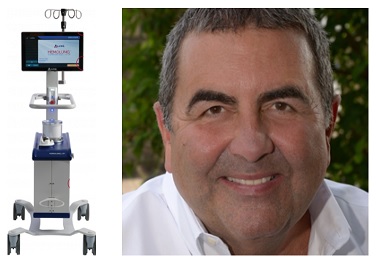 ALung Technologies, Inc., the leading provider of low-flow extracorporeal carbon dioxide removal (ECCO2R) technologies for treating patients with acute respiratory failure, announced that the Food and Drug Administration (FDA) has granted the company De Novo clearance for the Hemolung Respiratory Assist System. This system was developed at the McGowan Institute for Regenerative Medicine by a team of researchers led by faculty member William Federspiel, PhD, the company’s cofounder and professor of bioengineering, chemical engineering, critical care medicine, and the Clinical Translation Institute at the University of Pittsburgh. Dr. Federspiel is also the director of the Medical Devices Laboratory at the McGowan Institute.
ALung Technologies, Inc., the leading provider of low-flow extracorporeal carbon dioxide removal (ECCO2R) technologies for treating patients with acute respiratory failure, announced that the Food and Drug Administration (FDA) has granted the company De Novo clearance for the Hemolung Respiratory Assist System. This system was developed at the McGowan Institute for Regenerative Medicine by a team of researchers led by faculty member William Federspiel, PhD, the company’s cofounder and professor of bioengineering, chemical engineering, critical care medicine, and the Clinical Translation Institute at the University of Pittsburgh. Dr. Federspiel is also the director of the Medical Devices Laboratory at the McGowan Institute.
The Hemolung System is the first and only ECCO2R device cleared by the FDA. The Hemolung is indicated for respiratory support that provides extracorporeal carbon dioxide (CO2) removal from the patient’s blood for up to 5 days in adults with acute, reversible respiratory failure for whom ventilation of CO2 cannot be adequately or safely achieved using other available treatment options and continued clinical deterioration is expected.
“The FDA De Novo review process is designed to determine that the clinical benefits outweigh the clinical risks associated with a medical device when there is not a substantially equivalent predicate device. As a result, the De Novo process is quite rigorous. In order to demonstrate benefit over risk, ALung submitted data to FDA from over 1,000 Hemolung patient treatments on clinical safety and over 230 Hemolung patient treatments on clinical performance outcomes. This clinical data along with all of our pre-clinical data demonstrated to the FDA that the clinical benefits of the Hemolung for ECCO2R therapy has been substantiated. We look forward to introducing this new and valuable technology to the clinical market,” stated Peter DeComo, chairman and CEO of ALung.
“The Hemolung will be an important new treatment modality for acute respiratory failure to avoid or mitigate the harms from invasive mechanical ventilation. FDA clearance of the Hemolung is a game-changer for the treatment of these critically ill patients and will usher in a new era of extracorporeal lung support,” said Steven Conrad, MD, PhD, MCCM, medical director at ALung and professor of medicine at Louisiana State University Health Sciences Center.
The Hemolung is a first-of-its-kind, comprehensive, all-in-one system intended to provide minimally invasive, low-flow ECCO2R. Low-flow ECCO2R with the Hemolung is a lung-independent ventilatory support therapy for removal of CO2 waste molecules from venous blood via extracorporeal circulation through a single, 15.5 French, central venous catheter at blood flows of 350 – 550 mL/min. Respiratory failure patients often experience the need for CO2 removal without the need for supplemental oxygen. Historically, when extracorporeal therapy was indicated for the removal of CO2, extracorporeal membrane oxygenation (ECMO) devices were utilized because other alternatives were not available. ECMO is typically necessary when respiratory failure patients have a significant oxygenation issue. ECMO systems are complex, invasive, require high blood flows and as a result, require specialty personnel to monitor both the technology and the patient. The Hemolung offers ICU physicians, nurses, respiratory therapists and perfusionists a new tool to treat respiratory failure patients in a less complex, costly, and invasive manner.
ALung has been conducting the VENT-AVOID pivotal clinical trial for the treatment of Chronic Obstructive Pulmonary Disease (COPD) exacerbations and providing the Hemolung for the treatment of COVID-19 patients under an Emergency Use Authorization (EUA) granted by the FDA. The objective of the VENT-AVOID trial is to demonstrate that the Hemolung can avoid or minimize the need for invasive mechanical ventilation. The trial sites have enrolled 111 subjects making VENT-AVOID the largest ECCO2R trial ever conducted for this indication. ALung has also been working with numerous hospitals to treat COVID-19 patients with acute respiratory failure requiring CO2 removal. To date, the Hemolung has been utilized in the treatment of greater than 120 patients suffering from severe COVID-19 respiratory failure. In its EUA approval letter to ALung, the FDA stated that it believes the Hemolung has the potential to treat lung failure as an adjunct to noninvasive or invasive mechanical ventilation, to reduce hypercapnia and hypercapnic acidosis due to COVID 19, and/or to maintain normalized levels of partial pressure of carbon dioxide (PCO2) and pH in patients suffering from acute, reversible respiratory failure due to COVID-19 for whom ventilation of CO2 cannot be adequately, safely, or tolerably achieved and, in turn, may provide clinical benefit, and that there is no adequate, approved and available alternative to the emergency use of the Hemolung RAS to treat lung failure caused by COVID 19.
ALung Technologies, Inc. is a privately held Pittsburgh-based developer and manufacturer of innovative lung assist devices. Founded in 1997 as a spin-out of the University of Pittsburgh, ALung has developed the Hemolung as a dialysis-like alternative or supplement to mechanical ventilation. ALung is backed by Philips, UPMC Enterprises, Abiomed, The Accelerator Fund, Allos Ventures, Birchmere Ventures, Blue Tree Ventures, Eagle Ventures, Riverfront Ventures, West Capital Advisors, and other individual investors.
For more information about ALung and the Hemolung RAS, visit www.alung.com.
For more information on the VENT-AVOID trial, and a list of enrolling sites, please visit www.clinicaltrials.gov.
For more information on the use of the Hemolung RAS for COVID-19 patients, please visit www.alung.com/covid-19.
To listen to a Regenerative Medicine Today podcast featuring Dr. Federspiel and Mr. DeComo, please visit http://regenerativemedicinetoday.com/?s=209.
Illustration: Hemolung RAS (ALung)/Federspiel (McGowan Institute for Regenerative Medicine)
Read more…
